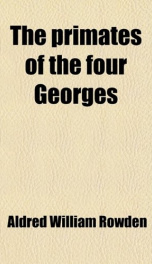the primates of the four georges

Purchase of this book includes free trial access to www.million-books.com where you can read more than a million books for free. This is an OCR edition with typos. Excerpt from book: THOMAS HERRING I747-I7s7 In passing from Potter to Herring we come, it appears fair to say, to a somewhat lower level. As we have said so often, it is idle to judge an archbishop of 1750 by the standard of 1900. Potter had imperfections: he was stilted and starchy ; did too well for himself and his belongings out of the emoluments of the Church, the draper's son leaving at his death £90,000, the equivalent of £200,000 nowadays ; showed scant sympathy with the efforts of Wesley and Whitfield to bring the degraded masses to the salvation of Jesus Christ. But withal, Potter was a man of parts and industry ; possessed of first-class abilities, he was from boyhood a diligent student, a good Latin and Greek scholar. When he wrote of Church Government and the Fathers he wrote of matters which he had studied deeply. His conviction that it was for the good of religion in this country to proceed and to proceed only on settled Church lines perhaps saved the English Church from innovations which a man like Hoadly might have thought improvements, but which would have been highly offensive to multitudes of Churchmen since, if not then. It is more difficult to point out the conspicuous merits of Herring. If he owed his preachership at Lincoln's Inn and much of his subsequent preferment to Lord Hardwicke, as seems probable, it is not likely the Great Chancellor promoted thus a man of no merit. The writer of his Life in the Preface to his published collection of seven sermons (repeated in the Biographica) is, in the style of biographers at that day, so profuse with his epithets of flattery that it is hard to dissect out the real man and his real virtues. The best means we have of getting at his true character is from his correspondence with William Duncombe. With this gentleman, an author...
Info about the book
Author:
Series:
Unknown
ISBN:
0546669697
Rating:
3/5 (5)Your rating:
0/5
Languge:
English
Users who have this book
Users who want this book
What readers are saying
What do you think? Write your own comment on this book!
write a commentif you like the primates of the four georges try:
Other books by this author
Do you want to exchange books? It’s EASY!
Get registered and find other users who want to give their favourite books to good hands!

